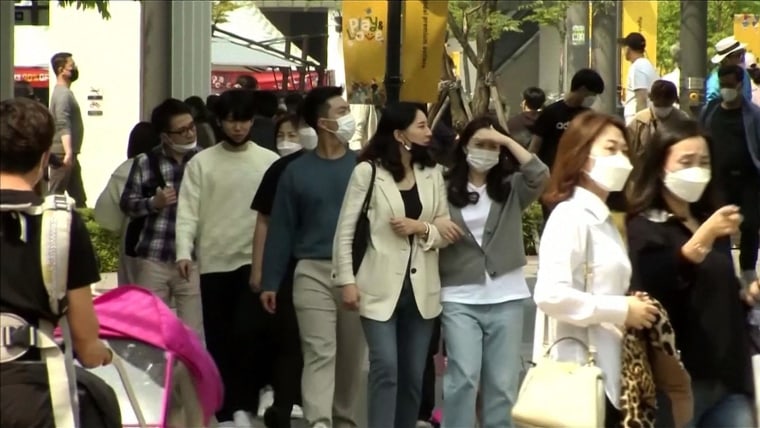South Korea ended its stringent social distancing policies Wednesday after halting the spread of the coronavirus. But although sports fans will soon be allowed to return to stadiums and as museums and libraries began to reopen, life remains far from normal.
Thermal scanners at theme parks, shopping for makeup while wearing masks and constant tracking of people’s whereabouts through apps and credit card data are markers of the new post-pandemic world in the country leading the way in its response to the virus.
“Everyday distancing does not mean returning to life before COVID-19,” Kim Kang Lip, vice minister of health and welfare, said Tuesday at a news briefing. “It means building new social norms and a culture based on exercising social distancing.”



Only two new cases of the virus and one death were reported Wednesday in South Korea following an aggressive campaign of early detection and tracing, in which over 1 million tests have been conducted since the first incident of the virus in late January. The result has been a death toll of only 255 people among a population of over 51 million.
State-run museums and libraries began opening their doors Wednesday. Professional sports, including baseball, began Tuesday, and soccer is expected to resume in the coming days. Both will allow spectators onsite, Kim said. A golf tournament scheduled for May 14 is also expected to go ahead.
Let our news meet your inbox. The news and stories that matters, delivered weekday mornings.
Full coverage of the coronavirus outbreak
But still, fears of a second wave of the virus have officials and individuals taking precautions. Wearing masks at all times in public will likely continue.
“Each and every one of us is assuming the responsibility of one’s own prevention of infection,” Kim said, adding that any signs of the virus’ return would result in lockdown rules’ being tightened again.
Everyone arriving in the country from overseas is required to install a smartphone app, on which they’re required to report their symptoms and temperature daily, while being placed under mandatory 14-day quarantines. They could also be made to wear tracking bracelets during their stay in the country.
Foreigners have to stay in a government facility for the period and have meals delivered to their doors to avoid any contact. Anyone who breaches the quarantine rules faces fines and even jail time.
Frequent hand-washing and maintenance of two arms-lengths’ distance from strangers is encouraged by the country’s center for disease control, while talking in public is also discouraged. Buses will carry advertisements advising people of the new measures.
Download the NBC News app for full coverage and alerts about the coronavirus outbreak
South Korea is also ramping up its ability to trace suspected cases and their contacts using a variety of databases from cellphones, street cameras and credit card purchases. The goal is to be able to trace people within minutes rather than a day, stopping virus hot spots from spreading.
As students prepare to return to school next week, the government is also building a hospital and setting up 1,000 clinics dedicated to treating the coronavirus to prepare for future waves.
Teacher Hannah Rader, an American living in Seoul, told NBC News that while they mean a loss of privacy, the government’s close tabs on the spread of the virus and the public’s collective effort to follow social distancing rules have been reassuring.
“I see why people could feel uncomfortable with it, but the trade-off for, you know, people not getting sick and hospitalized and dying, I think, is worth it,” she said.

